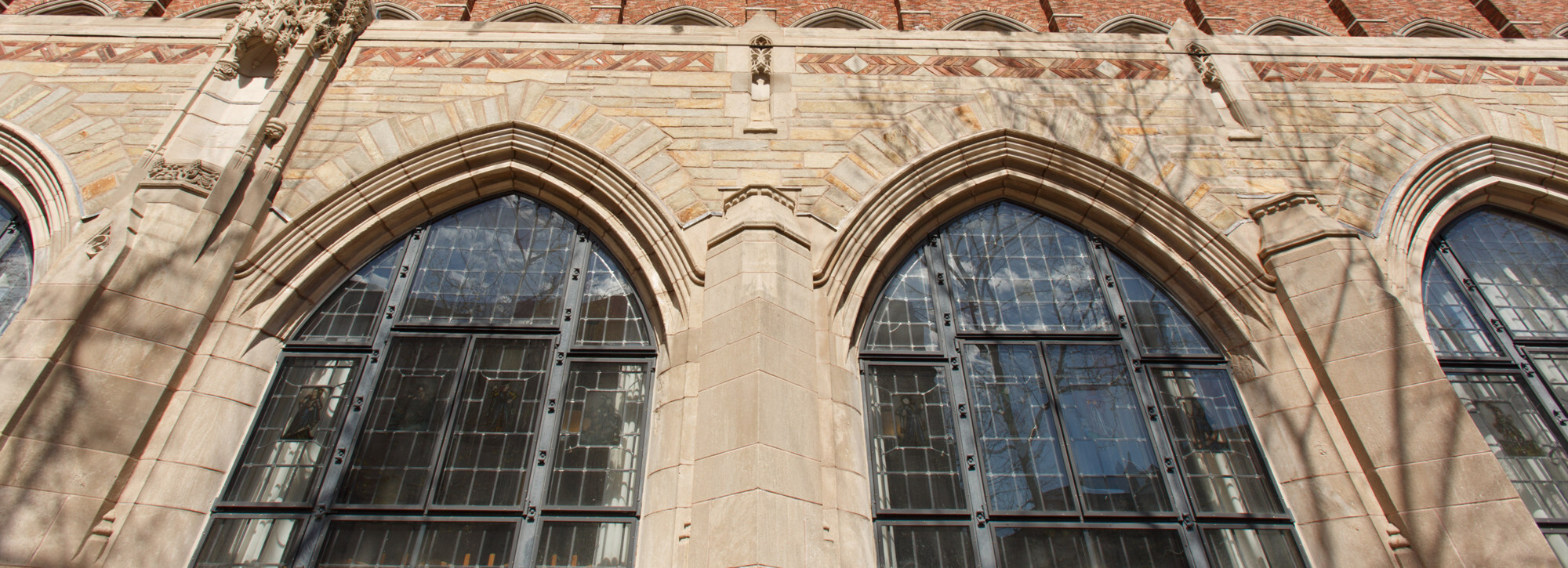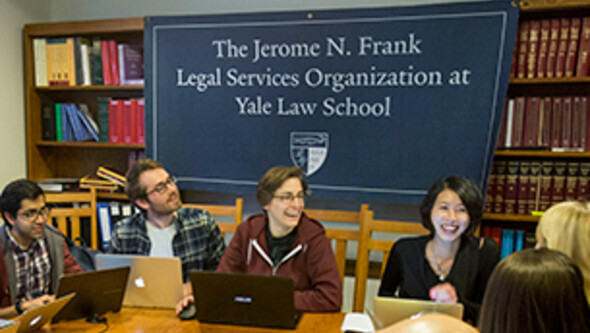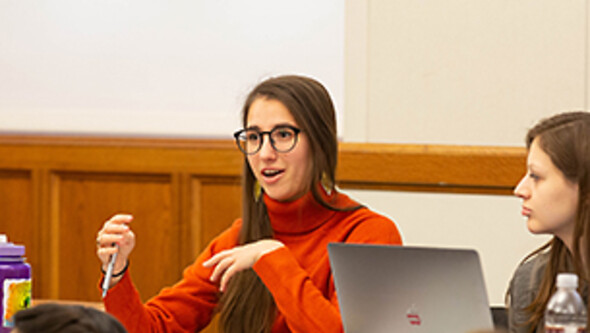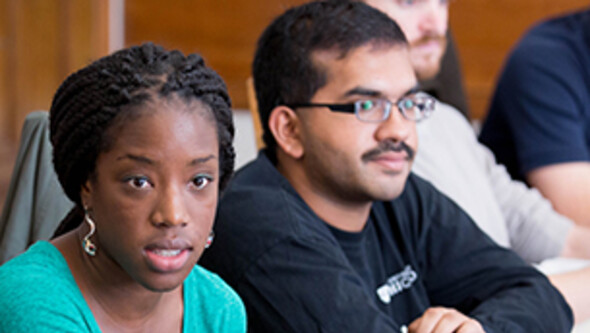The Yale Law School Supreme Court Advocacy Clinic represents parties and amici curiae at the certiorari and merits stages of Supreme Court litigation. The Clinic has also litigated rehearing petitions in the Courts of Appeals on limited occasions.
The Supreme Court's year is organized into Terms, each beginning the first Monday in October. Below are links to each of the Clinic's filings, organized by Term in which the case was heard. Where a case was argued on the merits, it appears in the Term in which it was argued, even if the petition for certiorari was filed in an earlier Term.
For other filings in merits cases, we recommend SCOTUSblog1 and the ABA brief archive2. The Supreme Court's rulings and orders, as well as transcripts of oral arguments, are available on its own web site3. Recordings of oral arguments and other documents are available from the Oyez Project4.
October Term 2019
- Dailey v. Florida, No. 19-1094: Petition for a Writ of Certiorari
- Arizona v. Nunez-Diaz, No. 19-645: Brief in Opposition
- Nasrallah v. Barr, No. 18-1432: Brief for Petitioner
- Corbitt v. Vickers, No. 19-679: Petition for a Writ of Certiorari
- Zadeh v. Robinson, No. 19-676: Petition for a Writ of Certiorari
- Espinoza v. Montana Department of Revenue, No. 18-1195: Brief for the Montana
Association of Rabbis as Amicus Curiae in Support of Respondents - Lucky Brand Dungarees Inc. v. Marcel Fashion Group Inc., No. 18-1086: Brief for Respondent
- Monasky v. Taglieri, No. 18-935: Brief for Respondent
- Court of Common Pleas of Pennsylvania v. Piasecki, No. 18-1490: Brief in Opposition
- Guerrero-Lasprilla, No. 18-776: Brief for Petitioners
October Term 2018
- Santana v. United States, No. 18-682: Petition for a Writ of Certiorari
- Hall v. Idaho, No. 18-679: Petition for a Writ of Certiorari
- Renteria v. United States, No. 18-1052: Petition for a Writ of Certiorari
- Manhattan Community Access Corp. v. Halleck, No. 17-1702: Brief for Respondent
- The First Presbyterian Church U.S.A. of Tulsa, Oklahoma v. Doe, No. 18-500: Brief in Opposition to Certiorari
- Lamone v. Benisek, No. 18-726: Brief for Respondent
- Kisor v. Wilkie, No. 18-15: Brief for Petitioner
- Smith v. Berryhill, No. 17-1606: Brief for Petitioner
- Monasky v. Taglieri, No. 18-935: Brief in Opposition to Certiorari
- Kansas v. Garcia, No. 17-834: Brief for Respondent
- Daniels v. United States, No. 18-460: Petition for a writ of Certiorari
October Term 2017
- Collins v. Virginia, No. 16-1027: Brief for Amicus Curiae Cato Institute in Support of Petitioner
- Lamar, Archer & Cofrin, LLP v. Appling, No. 16-1215: Brief for Respondent
- Minnesota Voters Alliance v. Mansky, No. 16-1435: Brief of Amici Curiae National Association of Counties et al. in Support of Respondents
- Neely v. Wisconsin Commission on Judicial Conduct and Ethics, No. 17-195: Brief for Respondent in Opposition to Certiorari
- Labor and Industry Review Commission of Wisconsin v. Coleman, No. 17-579: Brief for Respondent in Opposition to Certiorari
- Abbott v. Perez, No. 17-586, 17-626: Brief for Amici Curiae Common Cause and the Voting Rights Institute
- Huertas v. United States, No. 17-818: Petition for a Writ of Certiorari
- Trent v. United States, No. 17-830: Petition for a Writ of Certiorari
- Brown v. Brown, No. 17-887: Brief for Respondent in Opposition to Certiorari
- D.T. v. W.G., No. 17-913: Brief for Respondent in Opposition to Certiorari
- Michigan Gaming Control Board v. Moody, No. 17-1142: Petition for a Writ of Certiorari
- Garvin v. New York, No. 17-1320: Petition for a Writ of Certiorari
- Smith v. Berryhill, No. 17-1606: Petition for a Writ of Certiorari
October Term 2016
- Lee v. Tam, No. 15-1293: Brief of Amici Curiae for Native American organizations in support of petitioner
- Nelson v. Colorado, No. 15-1256: Brief of Amicus Curiae of the National Association of Criminal Defense Lawyers in support of petitioner
- Lynch v. Dimaya, No. 15-1498: Brief of the National Immigration Law Center as Amicus Curiae in support of respondent
- Expressions Hair Design v. Schneiderman, No. 15-1391: Brief of National Governors Association, National Association of Counties, National League of Cities, US Conference of Mayors, International City/County Management Association, and International Municipal Lawyers Association as Amici Curiae in support of respondents
October Term 2015
- Birchfield v. North Dakota, No. 14-1468: Petition for a Writ of Certiorari, Petitioner's Reply Brief, Brief for Petitioner, Reply Brief for Petitioner
- De La Paz v. Coy, No. 15-888: Petition for a writ of certiorari on behalf of petitioners
- Trinity Lutheran Church v. Pauley, No. 15-577: Brief of religious and civil rights organizations as Amici Curiae in support of respondent
- Friedrichs v. California Teachers Association, No. 14-915: Brief of constitutional law scholars in support of respondents
- Kansas v. Dull, No. 15-276: Brief in opposition to certiorari
- Fisher v. University of Texas at Austin, No. 14-981: Brief for Amici Curiae National Women’s Law Center, Gay & Lesbian Advocates & Defenders, and Lambda Legal Defense and Education Fund, Inc. et al. Supporting Respondents.
- Angov v. Lynch, No. 15-450: Petition for a Writ of Certiorari
- Birchfield v. North Dakota, No. 14-1468: Petition for a Writ of Certiorari and Reply
- Zepeda v. United States, No. 15-675: Petition for a Writ of Certiorari
October Term 2014
- Adame v. Lynch, No. 14-1495: Petition for a Writ of Certiorari and Reply
- Bernard v. Minnesota, No. 14-1470: Petition for a Writ of Certiorari and Reply
- LaChance v. Massachusetts, No. 14-1153: Petition for a Writ of Certiorari and Reply
- Espinal-Andrades v Holder, No. 14-1268: Petition for a Writ of Certiorari
- Salahuddin v. United States, No. 14-654: Petition for a Writ of Certiorari and Reply
- Williams-Yulee, No. 13-1499:
- Petition for a Writ of Certiorari and Reply (certiorari granted)
- Brief for Petitioner and Reply
- Kerry v. Din, No. 13-1402: Brief for Amici Curiae National Immigrant Justice Center and American Immigration Lawyers Association
- Colorado v. Schaufele, No. 14-266: Brief for Respondent in Opposition to Certiorari
- New York v. Theodore, No. 14-329: Brief for Respondent in Opposition to Certiorari
- Roman Catholic Church of the Diocese of Baton Rouge v. Mayeux, No. 14-220: Brief for Respondent in Opposition to Certiorari
October Term 2013
- Brown v. Shaw, No. 13-897: Brief for Respondent in Opposition to Certiorari
- Arizona v. Okun, No. 13-436: Brief for Respondent in Opposition to Certiorari
- Riley v. California, No. 13-132 and United States v. Wurie, No. 13-212: Brief for Amici Curiae Center for Democracy & Technology and Electronic Frontier Foundation
- Lane v. Franks, No. 13-483: Brief for Amicus Curiae Government Accountability Project in Support of Petitioner
- Harris v. Quinn, No: 11-681: Brief for Amici Curiae Homecare Historians in Support of Respondents
- United States v. Castleman, No. 12-1371: Brief for Respondent
October Term 2012
- Butts v. Hall, No. 12-813: Brief for Respondent in Opposition to Certiorari
- Jefferson County v. Elizabeth E., No. 12-1175: Brief for Respondent in Opposition to Certiorari
- Jeffries v. United States, No. 12-1185: Petition for a Writ of Certiorari
- United States v. Windsor, No. 12-307: Brief of Constitutional Law Scholars as Amici Curiae (Jurisdictional Questions)
- Wilson v. Flaherty, No. 12-986: Petition for a Writ of Certiorari
- Adoptive Couple v. Baby Girl, No. 12-399:
- Brief for Respondent in Opposition to Certiorari (certiorari granted)
- Respondent Brief
- Bernacki v. State of Connecticut, No. 12-759: Petition for a Writ of Certiorari and Reply
- Alexander v. Lewis, No. 12-470: Brief for Respondent in Opposition to Certiorari
- Kiehle v. County of Cortland, No. 12-607: Petition for a Writ of Certiorari
- Smith v. Colson, No. 12-390: Petition for a Writ of Certiorari and Reply
October Term 2011
- City of New Haven v. Briscoe, No. 11-1024: Brief for Respondent in Opposition to Certiorari
- Arizona v. United States, No. 11-182: Brief of State and Local Law Enforcement Officials as Amici Curiae in Support of Respondent
- Yang v. Holder, No. 11-1119: Petition for a Writ of Certiorari
- County of Erie v. Cash, No. 11-613: Brief for Respondent in Opposition to Certiorari (certiorari denied)
- Merrifield v. Board of County Commissioners for the County of Santa Fe, No. 11-881: Petition for a Writ of Certiorari (certiorari denied)
- Holder v. Sawyers, No. 10-1543: Brief for Respondent
- State of Connecticut v. Lenarz, No. 11-451: Brief for Respondent in Opposition to Certiorari (certiorari denied)
- Nielson v. Ketchum, No. 11-680: Petition for a Writ of Certiorari and Reply
- Astrue v. Capato, No. 11-159:
- United States v. Jones, No. 10-1259: Brief of Center for Democracy & Technology, Electronic Frontier Foundation, Matt Blaze, Andrew J. Blumberg, Roger L. Easton, and Norman M. Sadeh as Amici Curiae in Support of Respondent
- Faulkner v. United States, No. 11-235: Petition for a Writ of Certiorari and Reply (certiorari denied)
- Ragbir v. Holder, No. 10-1295: Petition for a Writ of Certiorari and Reply (certiorari denied)
- Rehberg v. Paulk, No. 10-788:
- Petition for a Writ of Certiorari and Reply (certiorari granted)
- Brief for Petitioner and Reply
October Term 2010
- DePierre v. United States, No. 09-1533:
- Petition for a Writ of Certiorari and Reply (certiorari granted)
- Brief for Petitioner and Reply
- Oral Argument Audio5
- Transcript
- Buonora v. Coggins, No. 10-237: Brief for Respondent in Opposition to Certiorari (certiorari denied)
- Depee v. Mahach-Watkins, No. 10-151: Brief for Respondent in Opposition to Certiorari (certiorari denied)
- Roberts v. Kauffman Racing Equipment, L.L.C., No. 10-617: Petition for a Writ of Certiorari and Reply (certiorari denied)
- County of Los Angeles v. Humphries, No. 09-350:
- Brief for Respondents in Opposition to Certiorari (certiorari granted)
- Brief for Respondents
- Oral Argument Audio6
- Transcript7
- Opinion
October Term 2009
- Stop the Beach Renourishment, Inc. v. Florida Department of Environmental Conservation, No. 08-1151:
- Carr v. United States, No. 08-1301:
- Petition for a Writ of Certiorari and Reply (certiorari granted)
- Brief for Petitioner and Reply
- Transcript9
- City of Ontario v. Quon, No. 08-1322: Brief of Electronic Frontier Foundation, Center for Democracy & Technology, American Civil Liberties Union, and Public Citizen as Amici Curiae in Support of Respondents;
- Christian Legal Society v. Martinez, No. 08-1371: Brief of State Universities and State University Systems as Amici Curiae in Support of Respondents
- Hensley v. United States, No. 09-480: Petition for a Writ of Certiorari and Reply (certiorari denied)
- Doe v. Reed, No. 09-559: Brief of the National Conference of State Legislatures, International City/County Management Association, National Association of Counties, and International Municipal Lawyers Association as Amici Curiae in Support of Respondents
- Zagorski v. Bell, No. 09-790: Petition for a Writ of Certiorari and Reply (certiorari denied)
- Mendiola v. Holder, No. 09-1378: Petition for a Writ of Certiorari and Reply (certiorari denied)
October Term 2008
- Quinn v. United States, No. 08-1583: Petition for a Writ of Certiorari (certiorari denied)
- Truth v. Kent School District, No. 08-1130: Brief for Respondent in Opposition to Certiorari (certiorari denied)
- El Paso v. Chertoff, No. 08-751: Petition for a Writ of Certiorari and Reply (certiorari denied)
- Harbison v. Bell, No. 07-8521: Brief for Petitioner and Reply
- Ricci v. DeStefano, Nos. 07-1428 & 08-328: Brief of International Municipal Lawyers Association, National League of Cities, National Association of Counties, and International Public Management Association for Human Resources as Amicus Curiae in Support of Respondents
- Hawaii v. Office of Hawaiian Affairs, No. 07-1372: Brief of the Sovereign Councils of the Hawaiian Homelands Assembly, Na 'A'huhiwa, the Native American Bar Association, Hui Kako'o 'aina Ho'o Pulapula, and 'Ahahui O Hawai'i as Amici Curiae in Support of Respondents
- Fitzgerald v. Barnstable School Committee, No. 07-1125:
- Petition for a Writ of Certiorari and Reply (certiorari granted)
- Brief for Petitioners and Reply
- Arizona v. Johnson, No. 07-1122: Brief for Respondent
- Negusie v. Holder, No. 07-499:
- Petition for a Writ of Certiorari and Reply (certiorari granted)
- Brief for Petitioner and Reply
October Term 2007
- Liddell v. United States, No. 08-227: Petition for a Writ of Certiorari and Reply (certiorari denied)
- National Institute of Military Justice v. U.S. Department of Defense, No. 08-125: Petition for a Writ of Certiorari and Reply (certiorari denied)
- Mercier v. Ohio, No. 08-17: Petition for a Writ of Certiorari, Reply, and Supplemental Brief (certiorari denied)
- Martin v. Kansas, No. 08-2: Petition for a Writ of Certiorari (certiorari denied)
- Baze v. Rees, No. 07-5439: Brief of Human Rights Watch as Amicus Curiae in Support of Petitioners
- United States v. Rodriquez, No. 06-1646:
- Brief for Respondent in Opposition to Certiorari (certiorari granted)
- Brief for Respondent
- Defenders of Wildlife v. Chertoff, No. 07-1180: Petition for a Writ of Certiorari and Reply (certiorari denied)
- United Arab Emirates v. El-Hadad, No 07-853: Brief for Respondents in Opposition (certiorari denied)
- Yang v. Mukasey, No. 07-756: Petition for a Writ of Certiorari (certiorari denied)
- D.P. v. School Board of Broward County, No. 07-613: Petition for a Writ of Certiorari and Reply
- Iouri v. Gonzales, No. 07-259: Petition for a Writ of Certiorari
October Term 2006
- City of Bridgeport v. Russo, No. 06-1575: Brief for Respondent in Opposition (certiorari denied)
- Jones v. Peralta, No. 06-1307: Respondent's Brief in Opposition (certiorari denied)
- Golphin v. Florida, No. 06-1251: Petition for a Writ of Certiorari and Reply (certiorari denied)
- Brooks v. Vassar, No. 06-1111: Petition for a Writ of Certiorari (certiorari denied)
- United States v. Wilk, No. 06-672: Brief of the Florida Association of Criminal Defense Lawyers as Amicus Curiae in Support of Petitioner (certiorari denied)
- Sole v. Wyner, No. 06-531: Brief of Americans United for Separation of Church and State, the Center for Inquiry, the Center for Public Representation, the Institute for Justice, Liberty Legal Institute, People for the American Way Foundation, Public Citizen, and teh Rutherford Institute as Amici Curiae in Support of Respondents
- Hein v. Freedom from Religion Foundation, Inc., No. 06-157: Brief for Respondents
- Permanent Mission of India v. City of New York, No. 06-134: Brief of the International Municipal Lawyers Association and U.S. Conference of Mayors as Amici Curiae in Support of Respondent
- Scott v. Harris, No. 05-1631: Brief of the National Association of Counties, National League of Cities, Council of State Governments, International City/County Management Association, U.S. Conference of Mayors, and International Municipal Lawyers Association as Amici Curiae Supporting Petitioner
- Gonzales v. Duenas-Alvarez, No. 05-1629: Brief of National Immigration Project of the National Lawyers Guild as Amicus Curiae in Support of Respondent
- Schriro v. Landrigan, No. 05-1575: Brief of National Association of Criminal Defense Lawyers as Amicus Curiae in Support of Respondent



